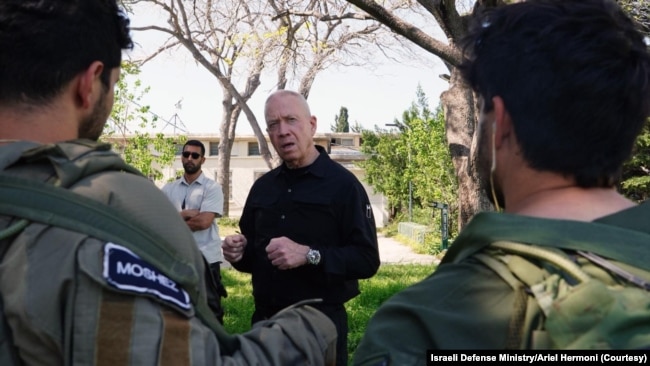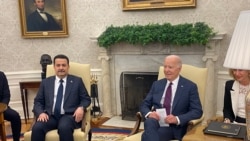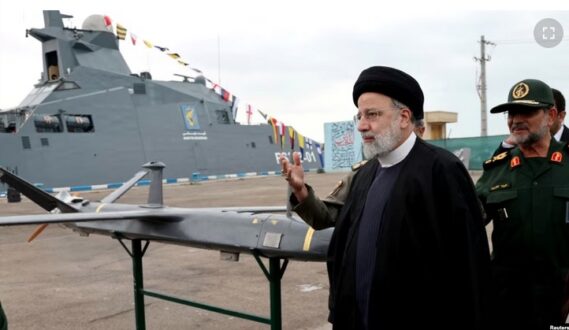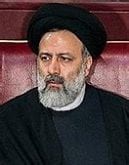VOA – Iranian President Ebrahim Raisi warned Wednesday against Israel retaliating for Iran’s unprecedented aerial attack on the Jewish state, saying Iran would follow with a “massive and harsh response.”
Raisi spoke during an annual military parade on the outskirts of Tehran, a day after Israel’s defense minister said Iranian threats would not deter an Israeli response.
Diplomats continued Wednesday to push for a de-escalation of the situation.
British Foreign Secretary David Cameron said during a visit to Jerusalem that it is clear Israel is making a decision to act, and that Britain hopes Israel responds “in a way that does as little to escalate this as possible.”
Cameron, who met with Israeli Foreign Minister Israel Katz, voiced support for enacting coordinated sanctions against Iran, as his counterparts from the Group of Seven leading industrial nations prepared for talks in Italy.
“I think there’s more that we can do to show a united front, that Iran is behind so much of the malign activity in this region, backing Hamas, backing Hezbollah, backing the Houthis,” Cameron said. “They need to be given a clear, unequivocal message by the G7.”
Israel’s Defense Ministry on Tuesday quoted Defense Minister Yoav Gallant saying, “The Iranians failed in their attack and will fail to deter Israel.”
Senior U.S. officials have said the Iranian attack on Israel, the first ever launched from Iranian soil, involved more than 110 ballistic missiles, 30 cruise missiles and more than 150 one-way, explosive aerial drones. They said Iranian proxy forces in Iraq, Syria and Yemen also took part in the attack.
Iranian officials have issued a series of verbal warnings to Israel as it considers its response, vowing that Tehran will respond quickly and harshly to Israeli action that harms the Islamic republic’s interests.
Iran has called Sunday’s aerial assault a one-off event carried out in retaliation for what Tehran said was an Israeli airstrike that killed senior Iranian commanders in Damascus on April 1. Israel has neither confirmed nor denied responsibility for that attack.

“The Iranians will not be able to establish a new status of deterrence against Israel,” Gallant said, according to the Defense Ministry. “[Israeli] aircraft operate everywhere — the skies of the Middle East are ‘open,’ and any enemy that fights us will be hit, no matter where they may be,” he added.
The Israeli war Cabinet, which includes Gallant, has met repeatedly in recent days to debate Israel’s response options.
Speaking to VOA’s “Flashpoint Global Crises” program in a Tuesday phone interview from northern Israel, former Israeli intelligence official Avi Melamed said Israel could retaliate against Iran with a direct military strike on Iranian territory, a cyberattack or some other kind of covert kinetic action.

Any Israeli retaliation likely would have to be coordinated with the United States, said Melamed, who runs Inside the Middle East, a U.S. nonprofit research group. He said an Israeli response also would need to make Iran pay a significant price that sends a strong message to the region while not being so painful that it triggers further Iranian escalation.
“When I look at all those components, I think it is very likely that there will be a series of covert, significant Israeli actions against Iranian assets,” Melamed said.
State Department spokesperson Matthew Miller said in a Tuesday briefing that Secretary of State Antony Blinken, in consultations with his regional counterparts, has let it be known that the U.S. does not want to see further escalation of the Iran-Israel conflict.
British media said Prime Minister Rishi Sunak delivered a similar message to his Israeli counterpart Benjamin Netanyahu in a Tuesday phone call. They cited a Downing Street readout of the call, in which Sunak is quoted as saying “significant escalation was in no one’s interest and would only deepen insecurity in the Middle East.”
Earlier Tuesday, Israeli Foreign Minister Katz said in a post on the X platform that he has reached out to 32 nations to push for sanctions against Iran’s missile program and to declare Iran’s top military force, the Islamic Revolutionary Guard Corps (IRGC), a terrorist organization.
Alongside the military response to the firing of the missiles and the UAVs, I am leading a diplomatic offensive against Iran. This morning I sent letters to 32 countries and spoke with dozens of foreign ministers and leading figures around the world calling for sanctions to be…— ישראל כ”ץ Israel Katz (@Israel_katz) April 16, 2024
The United States is one of several countries that already designate the IRGC as a terror group. Since October, the U.S. has imposed several rounds of sanctions targeting the Iranian ballistic missile program as U.N. sanctions on that program expired.
In a Tuesday briefing, European Union foreign policy chief Josep Borrell said some member states proposed expanding “restrictive measures” against Iran.
🔴 Follow live: HR/VP @JosepBorrellF press remarks following today’s Informal meeting of EU Foreign Affairs Ministers via video-conference #FAC https://t.co/9xI0dZjWsk— European External Action Service – EEAS 🇪🇺 (@eu_eeas) April 16, 2024
He said he agreed to ask the External Action Service that carries out the European bloc’s foreign and security policy to start work on new sanctions that could penalize Iran’s weapons deliveries to its proxy forces and any Iranian supplies of missiles to Russia.
VOA’s State Department bureau chief Nike Ching contributed to this report.
 Shabtabnews In this dark night, I have lost my way – Arise from a corner, oh you the star of guidance.
Shabtabnews In this dark night, I have lost my way – Arise from a corner, oh you the star of guidance.



